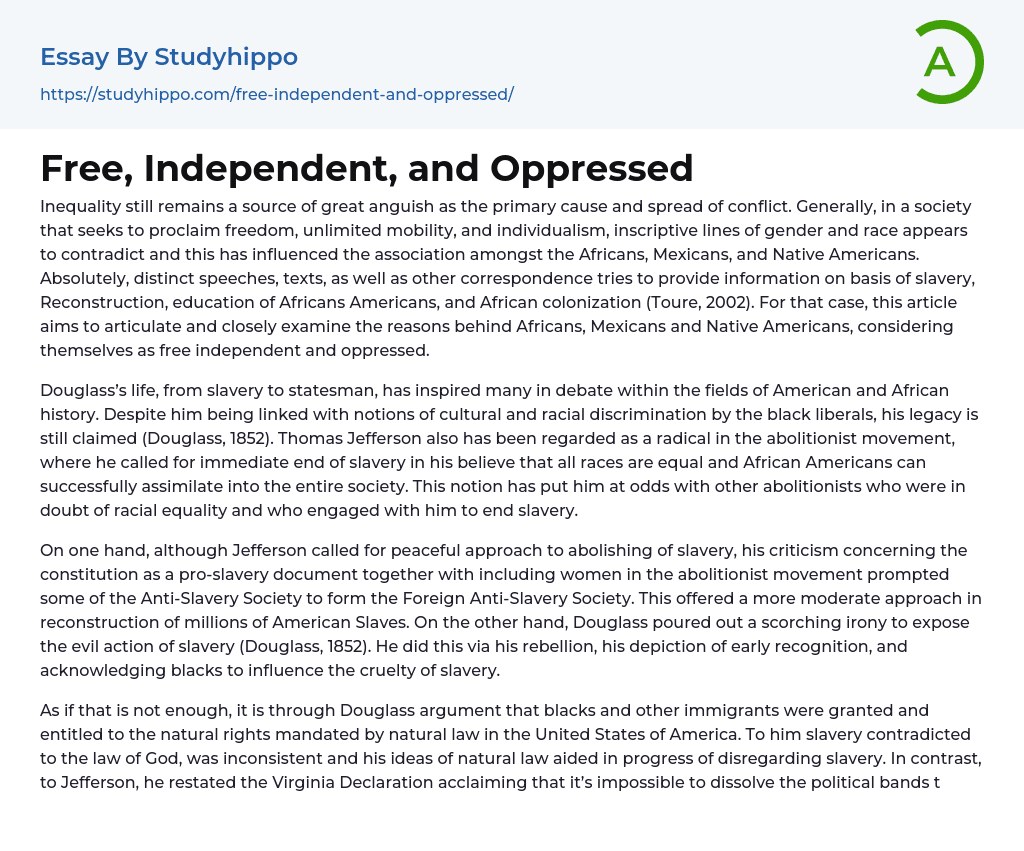Inequality still remains a source of great anguish as the primary cause and spread of conflict. Generally, in a society that seeks to proclaim freedom, unlimited mobility, and individualism, inscriptive lines of gender and race appears to contradict and this has influenced the association amongst the Africans, Mexicans, and Native Americans. Absolutely, distinct speeches, texts, as well as other correspondence tries to provide information on basis of slavery, Reconstruction, education of Africans Americans, and African colonization (Toure, 2002). For that case, this article aims to articulate and closely examine the reasons behind Africans, Mexicans and Native Americans, considering themselves as free independent and oppressed.
Douglass’s life, from slavery to statesman, has inspired many in debate within the fields of American and African history. Despite him being linked with notions of cultural and raci
...al discrimination by the black liberals, his legacy is still claimed (Douglass, 1852). Thomas Jefferson also has been regarded as a radical in the abolitionist movement, where he called for immediate end of slavery in his believe that all races are equal and African Americans can successfully assimilate into the entire society. This notion has put him at odds with other abolitionists who were in doubt of racial equality and who engaged with him to end slavery.
On one hand, although Jefferson called for peaceful approach to abolishing of slavery, his criticism concerning the constitution as a pro-slavery document together with including women in the abolitionist movement prompted some of the Anti-Slavery Society to form the Foreign Anti-Slavery Society. This offered a more moderate approach in reconstruction of millions of American Slaves. On the other hand, Douglass poured out a scorching irony to expose the
evil action of slavery (Douglass, 1852). He did this via his rebellion, his depiction of early recognition, and acknowledging blacks to influence the cruelty of slavery.
As if that is not enough, it is through Douglass argument that blacks and other immigrants were granted and entitled to the natural rights mandated by natural law in the United States of America. To him slavery contradicted to the law of God, was inconsistent and his ideas of natural law aided in progress of disregarding slavery. In contrast, to Jefferson, he restated the Virginia Declaration acclaiming that it’s impossible to dissolve the political bands that act as connection whenever government threatened natural rights (Jefferson, 1952). The declaration of Independence was a propaganda document, and so, didn’t grant anyone any right. Their signatures were a clear approval of mutually pledging to each other that they were ready to support the lives of Africans and other illegal immigrants.
Given these circumstances, Douglass and Jefferson’s legacy as history’s most eloquent proponent of achieving human freedom and earning equality to all remains complicated but their inconsistencies offers life as slave owners. So, Africans, Mexicans, and Native Americans have all the reason to celebrate the special holiday on 4th July as an account of making the truths to be self-evident (Malavet, 2004). Amongst themare lives, pursuit for happiness, and liberty – a need for secured rights, to derive their just powers from the consent of those they govern.
References
- Douglass, F. (1852). What to the Slave is the Fourth of July?. Rochester Ladies Anti-Slavery
Society, Rochester, New York, 5. - Glenn, E. N. (2009). Unequal freedom: How race and gender shaped American citizenship and
labor. Harvard University Press. - Jefferson,
T. (1952). The declaration of independence. Encyclopedia Britannica.
States and Puerto Rico. NYU Press.
Cultural Location and National Destiny. Black Cultures and Race Relations, 16-50.
- Adaptation essays
- Adventure essays
- Adversity essays
- Aging essays
- Alcohol essays
- Barbie Doll essays
- Beauty essays
- Care essays
- Carpe diem essays
- Change essays
- Chess essays
- Chicken essays
- Choices essays
- Contrast essays
- Crops essays
- Development essays
- Dream essays
- Evil essays
- Experience essays
- Family essays
- Farm essays
- Fire essays
- First Love essays
- Focus essays
- Greed essays
- Hero essays
- Holiday essays
- House essays
- Housing essays
- Humility essays
- Humor essays
- Hypocrisy essays
- Integrity essays
- Law of Life essays
- Life Changing Experience essays
- Life Experience essays
- Lifestyle essays
- Limitations essays
- Love Story essays
- Mother Tongue essays
- Motherhood essays
- My Neighborhood essays
- Myself essays
- Mystery essays
- Narcissism essays
- Never Give Up essays
- Nursing essays
- Object essays
- Opportunity essays
- Peel essays




